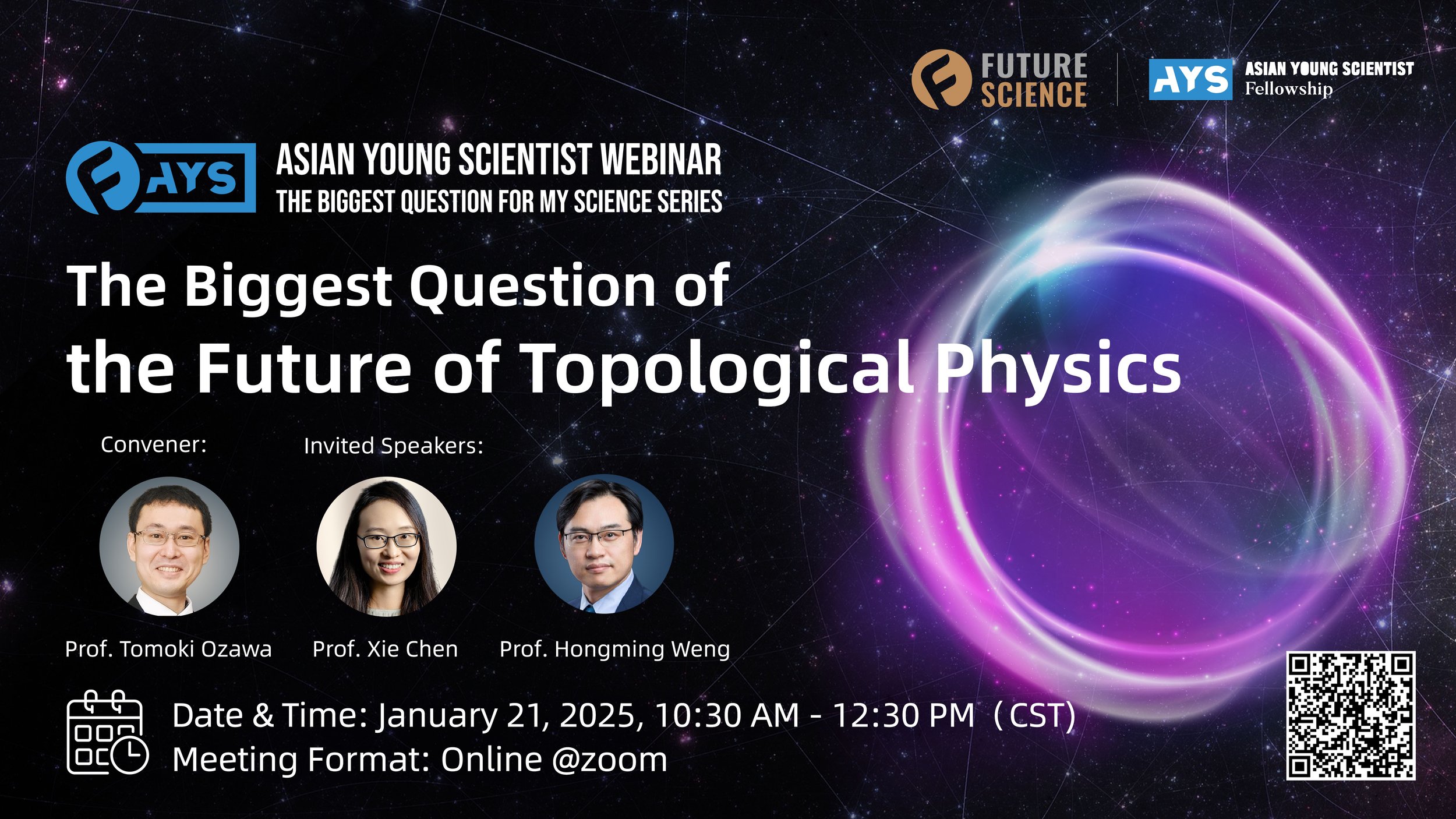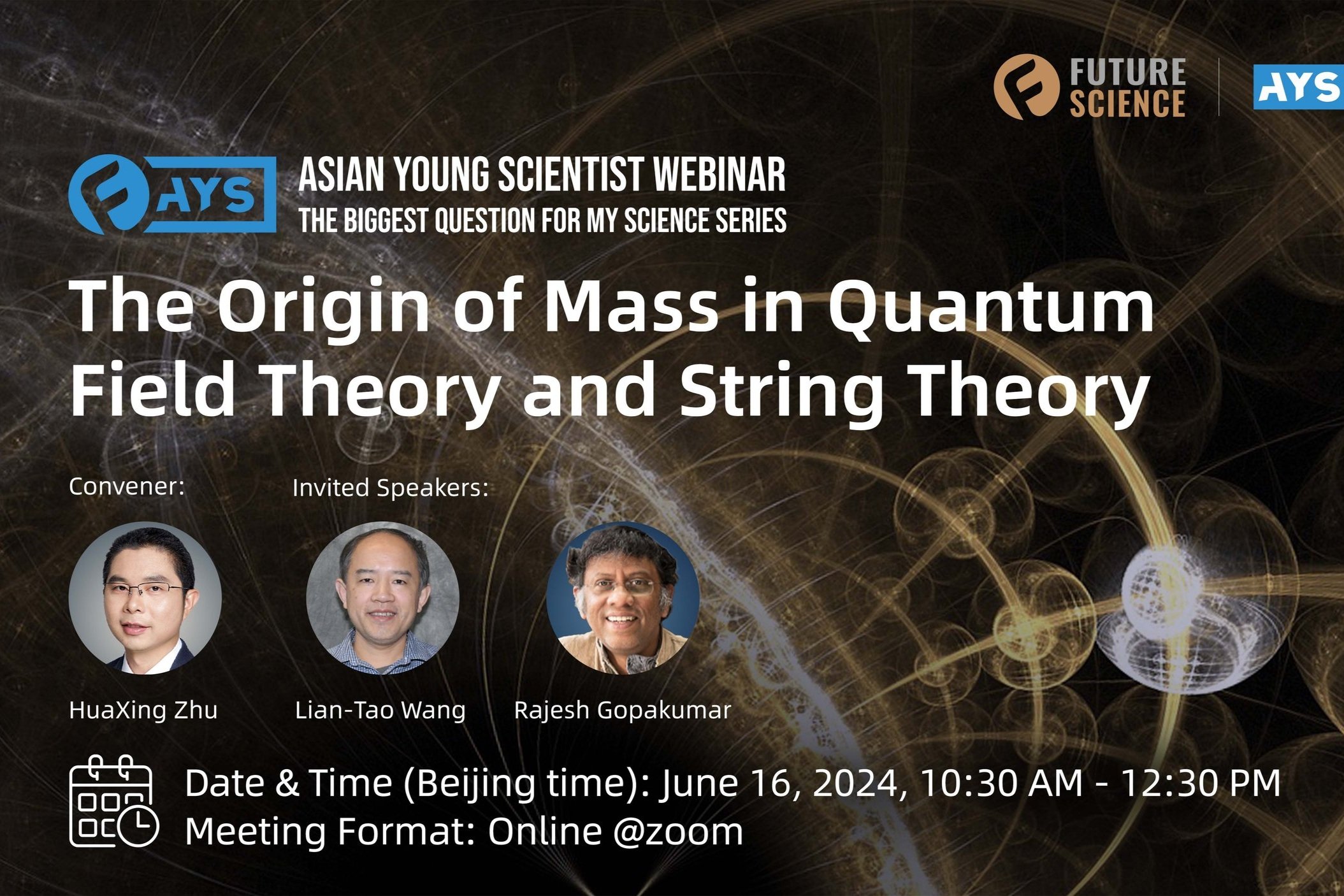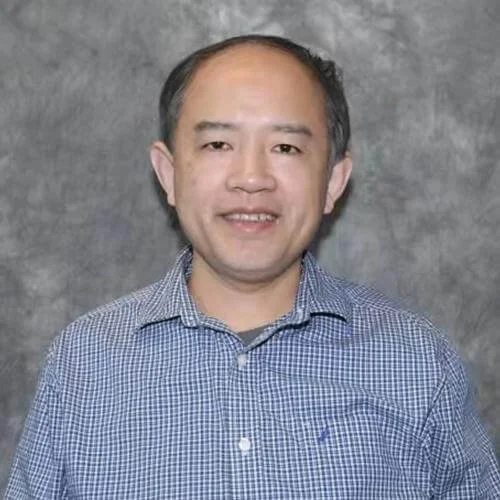
Asian Young Scientist Webinar
“The Biggest Question for My Science” Series
As the saying goes, “asking the right question is half the answer.” The Biggest Question for My Science event series fosters a deeper understanding of the fundamental questions that drive scientific discovery.
Each session invites one AYS Fellow and one prominent scientist, both from related research fields, to identify the biggest question in their research field and to discuss why it is the biggest question and how the scientific community is approaching it, essentially taking a step back to look at the big picture.
This series is tailored for students and faculty members with a keen interested in science, research, and grappling with scientific inquiries in this field. This event series will be held monthly via online Zoom meetings and is open to participation.

The Biggest Question of the Future of Topological Physics
The Biggest Question for My Science
Session 4- The Biggest Question of the Future of Topological Physics
Since the discovery of the quantum Hall effect and its relation to topological properties of the wavefunction, topology has become an essential mathematical tool to understand phases of matter. The discovery of topological insulators around 20 years ago has also contributed to the vast expansion of the field. On the one hand, the use of topology in physics is expanding and diverging. On the other hand, we hear some people saying that most of the important questions have been answered and no major question is left in the field of topological phases of matter. We would like to discuss the following question; where is the field going? Is the field going to an end, or to a beginning of a new field?
Date and Time:
l Beijing Time: January 21, 2025, 10:30 AM - 12:30 PM
l Tokyo Time: January 21, 2025, 11:30 AM - 1:30 PM
l California Time: January 20, 2025, 6:30 - 8:30 PM
Meeting Format: Online @ Zoom
Meeting ID: 360 103 9307
Password: AYSF
Agenda (Beijing Time)
- 10:20 - 10:35 Zoom meeting room open
- 10:35 - 10:40 Opening by Prof. Tomoki Ozawa
- 10:40 - 11:00 “Topological “phases’ for atoms, photons, and classical systems”
l Presentation by Prof. Tomoki Ozawa (15 mins) and Q&A (5 mins)
- 11:00 - 11:20 “ Topological order in strongly interacting systems”
l Presentation by Prof. Xie Chen (15 mins) and Q&A (5 mins)
- 11:20 - 11:40 “Topological electronic materials and their identification through machine learning”
l Presentation by Prof. Hongming Weng (15 mins) and Q&A (5 mins)
- 11:40 - 12:30 Open Discussion (30 mins) + Q&A (20 mins)
l Moderator: Prof. Tomoki Ozawa
l Panelists: Prof. Xie Chen, Prof. Tomoki Ozawa, Prof. Hongming Weng
- 12:30 Group Photo
Convener (AYS Fellow):
Tomoki Ozawa, Associate Professor, Advanced Institute for Materials Research, Tohoku University; 2023 AYS Fellow-Physical Science, Asian Young Scientist Fellowship
Dr. Tomoki Ozawa is Associate Professor and Junior Principal Investigator at the Advanced Institute for Materials Research at Tohoku University. He received PhD in physics from the University of Illinois at Urbana-Champaign in 2012. He then spent five years, first as a postdoc and then as a senior postdoc, at the Bose-Einstein Condensation Center at the University of Trento, Italy. He came back to Japan in 2018 to become a Senior Researcher at RIKEN. He moved to Tohoku University in 2020. Dr. Ozawa is a theoretical physicist, and his research area is in the interdisciplinary intersection between condensed matter physics and AMO (atomic, molecular, and optical) physics. He has been a pioneer in applying concepts of topological insulators to AMO platforms, contributing to the development of concepts such as synthetic dimensions, topological lasers, and topological phenomena in driven-dissipative systems. He has co-authored an influential review on topological photonics in Reviews of Modern Physics, which has received more than 2500 citations (Google Scholar). He has been a Tohoku University Distinguished Researcher since 2021, and is a recipient of the Young Scientists' Award from the Ministry of Education, Culture, Sports, Science and Technology of Japan.
Invited Speakers:
Xie Chen, Professor of Theoretical Physics at the California Institute of Technology; Science Committee Member, Future Science Prize
Xie Chen is a Professor of Theoretical Physics at the California Institute of Technology. Dr. Chen obtained her BSc degree from Tsinghua University in 2006 and PhD degree from the Massachusetts Institute of Technology in 2012. She was a Miller research fellow at the University of California Berkeley for two years before joining Caltech in 2014. Dr. Chen is a condensed matter theorist. She has made a series of contributions to the study of strongly correlated quantum many-body systems, including the classification of gapped phases in one dimension, discovery and systematic construction of symmetry protected topological phases in bosonic system in two and higher dimensions, classification and anomaly detection in symmetry enriched topological phases, the tensor network representation of topological phases and unitary evolutions, and the study of fracton models. Dr. Chen was the recipient of NSF Faculty Early Career Award and the Sloan Research Fellowship Award. She was awarded the New Horizons in Physics Prize in 2020 by the Breakthrough Foundation for her incisive contributions to the understanding of topological states of matter and the relationships between them. In 2021, she was named a Simons Investigator by the Simons foundation.
Hongming Weng, Professor of Physics, Institute of Physics, Chinese Academy of Sciences; 2025 Physical Science Sub-Committee Chair, Asian Young Scientist Fellowship
Hongming WENG is a professor of physics at Institute of Physics, Chinese Academy of Sciences (IOP-CAS). He obtained his PhD from Nanjing University in 2005. He was a postdoc in Institute for Materials Research, Tohoku university (2005-2007) and an assistant professor in Japan Advanced Institute of Science and Technology (2007-2010). He joined IOP-CAS in 2010. He works in the field of computational condensed matter physics, including the method and program for first-principles calculations, topological electronic states and quantum materials. He was awarded JSPS postdoc Fellowship (2007), Nishina Asia Award (2017), CAS Young Scientist Award (2018), NSFC Distinguished Young Scientist (2019) and APS Outstanding Referees (2021).
To enrich the AYS Webinar series, we welcome young scientists to raise your "Biggest Questions"! This is a unique chance to engage with thought-provoking topics or ask our expert speakers directly. Your questions will engage discussions and deepen the conversation. Don’t miss this opportunity to connect, learn, and contribute!

The Origin of Mass in Quantum Field Theory and String Theory
The Biggest Question for My Science
Session 1 - The Origin of Mass in Quantum Field Theory and String Theory
The origin of the mass of visible matter in our universe is a pivotal question in both physics and broader scientific inquiry. According to the Standard Model of particle physics, approximately 1% of mass originates from the Higgs field, while about 99% results from the strong interactions between quarks and gluons. Both factors play crucial roles in the evolution of the universe and the emergence of life.
Click here for the event review
Date and Time:
l Beijing Time: June 16, 2024 (Sunday), 10:30 AM- 12:30 PM
l India Time: June 16, 2024 (Sunday), 8:00 - 10:00 AM
l Chicago Time: June 15, 2024 (Saturday), 9:30 - 11:30 PM
Meeting Format: Online @ Zoom
Joining link: https://us06web.zoom.us/j/3601039307?pwd=kkOMYogz2XULJvO52G1Z5bUUoFetVK.1
Meeting ID: 360 103 9307
Password: AYSF
Agenda (Beijing Time)
- 10:20 - 10:35 Zoom meeting room open
- 10:35 - 10:40 Opening Remark
l Dr. Eric Chen, Chairman of BaseBit Technologies; Co-CEO of ARM China Independent director of Applied Materials; Donor of the Asian Young Scientist Fellowship
- 10:40 - 11:00 Presentation by Prof. Liantao Wang
l The origin of mass through the Higgs mechanism and the most fundamental questions to be answered there.
- 11:00 - 11:20 Presentation by Dr. Huaxing Zhu
l The current understanding of how mass emerges from strong interactions of quarks and gluons highlights some key unresolved questions.
- 11:20 - 11:40 Presentation by Prof. Rajesh Gopakumar
l How strings with tension emerge from strong interactions and seek to fundamentally understand how strings arise from quantum field theories (QFTs).
- 11:40 - 12:10 Open Discussion
l Moderator: Dr. Huaxing Zhu
l Panelists: Prof. Rajesh Gopakumar, Prof. Liantao Wang, Dr. Huaxing Zhu
- 12:10 - 12:30 Q&A
Convener (AYS Fellow):
HuaXing Zhu, Associate Professor, School of Physics, Peking University; 2023 AYS Fellow-Physical Science, Asian Young Scientist Fellowship
HuaXing Zhu is an Associate Professor at the School of Physics, Peking University. He obtained his PhD degree in 2012 from Peking University. Since then, he has been a postdoctoral fellow at SLAC National Accelerator Laboratory and the Center for Theoretical Physics at MIT. He held a tenured-track researcher position at Zhejiang University from 2017 to 2023 before moving to Peking University. His research interests involve quantum field theory and particle physics, with a particular focus on the development of theoretical tools for understanding the strong interactions of quarks and gluons in quantum chromodynamics. He received the Qiushi Outstanding Young Scholar Award in 2020 for his contributions to theoretical particle physics.
Invited Speakers:
Rajesh Gopakumar, Distinguished Professor, International Centre for Theoretical Sciences, Tata Instt. of Fundamental Research; Member of the Steering Committee, Asian Young Scientist Fellowship
Prof. Rajesh Gopakumar is a theoretical physicist who is Senior Professor and Director of the International Centre for Theoretical Sciences, Tata lnstitute of Fundamental Research in Bengaluru. His research interests are in string theory and quantum field theory aiming to understand the nature of fundamental interactions in nature.
He completed his MSc in physics from llT Kanpur in 1992 and received his PhD from Princeton University in 1997. After a few years as a Research Associate at Harvard University, he joined Harish Chandra Research institute, Allahabad in 2001 where he was until 2015. He was also a Visiting Fellow at the lnstitute for Advanced Study, Princeton, New Jersey from 2001 to 2004.
Prof. Gopakumar's work in theoretical physics aims to understand the versatility of string theory and he has developed a program to decipher the AdS/CFT correspondence. His early research was primarily focused on large N gauge theories, non-commutative gauge theories and topological string theory. His work in the context of topological string theory has also had an impact in mathematics in what are now known as the Gopakumar-Vafa invariants. He has recently also worked on the conformal bootstrap in quantum field theory.
He is the recipient of the B.M. Birla Science Prize in Physics in 2004, the lCTP Prize in 2006, the Swarnajayanti Fellowship in 2006, the Shanti Swarup Bhatnagar Award in 2009, the GD Birla Prize in 2013 and the JC Bose National Fellowship in 2015. He is a founding member of the Global Young Academy and was elected the Fellow of The World Academy of Sciences in 2015. He is also a Fellow of the lndian Academy of Sciences, the lndian National Science Academy (INSA)and the National Academy of Sciences, India (NASI). In 2019, he received llT Kanpur's Distinguished Alumnus Award.
Lian-Tao Wang, Professor, Department of Physics and Enrico Fermi Institute University of Chicago; Member, Science Committee of the Future Science Prize
Liantao Wang is the professor of Enrico Fermi Institute, Department of Physics, and Kalvi Institute for Cosmological Physics at the University of Chicago. He completed his B.S. at Fudan University (1995) and Ph.D. at the University of Michigan (2002). He later worked as a research associate at the University of Wisconsin and Havard University. He joined the faculty of Princeton University in 2006 and moved to the University of Chicago in 2011. He is a Fellow of the American Physics Society. He has won an Early Career Award of US Department of Energy (2010-2015), and Outstanding Junior Investigator Award of US Department of Energy (2008-2010). His focus has been on various aspects of the phenomenology of elementary particle physics.










